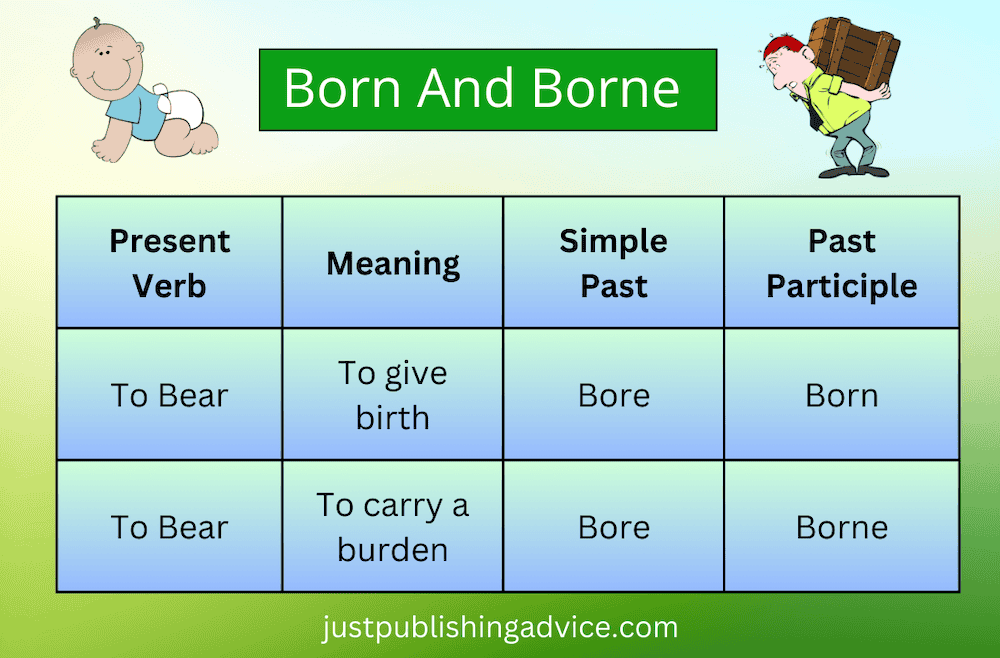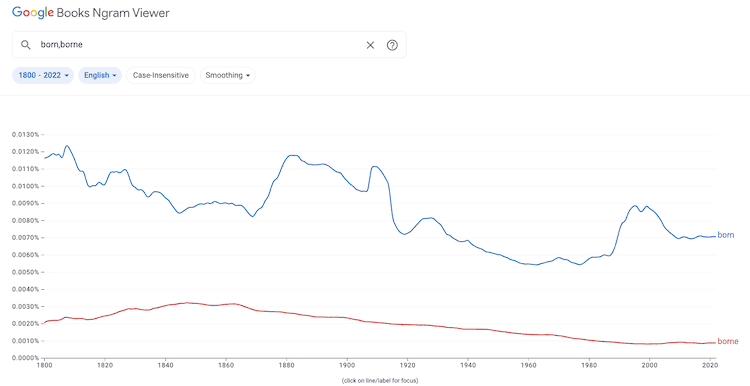
Homophones and homonyms can often cause confusion for writers, but born and borne is one of the extreme examples.
With words that sound the same, especially in fixed expressions, you usually have a right and wrong choice.
However, in this case, both are 100% correct, but you need to choose based on the context of a sentence.
The two words are different past participles for the same verb, to bear, but with totally different meanings.
The grammar of borne and born
The verb, to bear, is the same in the present and past. That is, bear and bore.
However, it has two possible past participles, which you usually find in passive and perfect sentences. You can also occasionally use them as adjectives.
Here’s a quick table of the verb forms.

As you can see, choosing the correct verb depends solely on the meaning.
If you are talking about the birth of a baby, born is the correct choice and also the most common use.
It’s rare that you would use the present or past simple forms of the verb in this case.
However, if the meaning relates to carrying a burden or responsibility for something, borne is the correct choice.
In this sense, it is also commonly used in the present and past simple forms.
Understanding these differences can help you make the right vocabulary choice.
Meaning and usage of born
Born is the past participle of bear when you are referring to birth.
You can also use it when talking about someone’s entry into the world or a natural talent.
In these senses, you can say she was born in Amsterdam, or he was born to be a musician.
Because it is a past participle, it can also be an adjective, such as a born leader.
Expressions like being born with a silver spoon describe an innate quality or circumstance from birth.
When you need to use the present or simple past or bear, when referring to birth, it’s usual to use the verb have in its place.
For example, my daughter has two children, and my great-grandmother had eight children.
Meaning and usage of borne
Borne is the past participle of bear for all other contexts. You can also use the present and past forms, bear and bore.
It means to take responsibility, carry, endure, or transport.
For instance, she has borne many hardships during her life, conveys the idea of enduring struggles.
The costs of the manufacturing fault were borne by the company, means the company took on the financial burden. You could also say that the company bore the costs.
You also see it in compound words like airborne and waterborne to indicate something carried through the air or water.
Whenever the idea involves carrying, enduring, or supporting something, borne is the appropriate choice.
When both can be correct
Some fixed expressions, like bear or bare your soul, clearly have a right and wrong vocabulary choice.
However, with born and borne, it’s not so clear-cut.
It is unusual, but occasionally, especially when referring to revolutions or popular movements, both verbs can work.
Here are a couple of examples.
A new political party was born out of struggle. (Common use)
A new political party was borne out of struggle. (Less common but acceptable)
The ’60s hippie movement was born out of opposition to war, a desire for personal freedom, and a rejection of mainstream materialism. (Common use)
The ideals of peace and love were borne out of deep discontent with the Vietnam War and racial injustice. (Less common but acceptable)
Whenever you consider using either of these words, it’s always about the context of a sentence.
Quick tip to get it right
The easy way to choose between the two is to remember that born always relates to birth.
If your sentence refers to someone or something coming into existence, it’s always the right word.
For any other sense, such as carrying, enduring, or supporting, it’s borne.
A good way to remember this is with the mnemonics, born birth, and borne burden.
Summary
No doubt, you will use borne less frequently than born in writing because there are many other ways you can express the same sense of burden with different vocabulary.
You can see by the usage graph that borne has fallen away in use over time.

But that’s not a good reason not to understand and have it ready when you need it.
Related Reading: Worst Comes to Worst Or Worse Comes to Worst?
Share This Article


